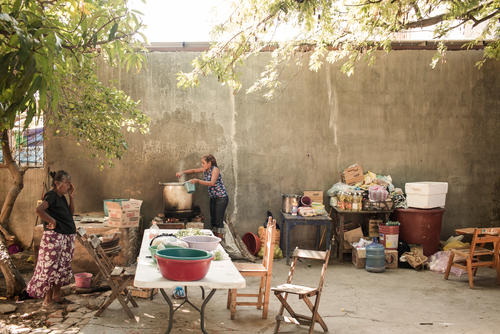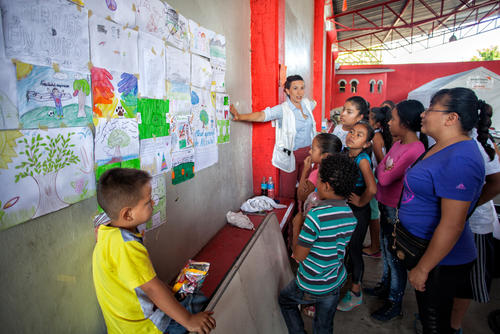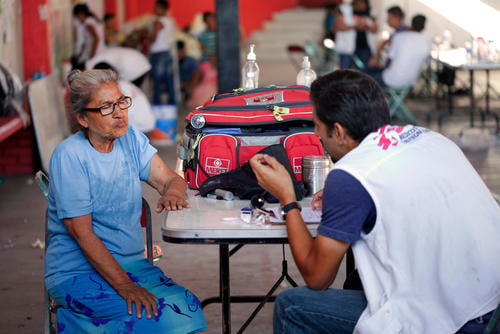In November, Médecins Sans Frontières (MSF) teams in Mexico City, Mexico State, Puebla, Oaxaca and Morelos concluded the medical, mental health and heath promotions activities that were launched in response to the emergency situations created by two major earthquakes in September.
MSF in Puebla
In the days following the earthquake on 19 September, MSF emergency response teams surveyed affected communities in Puebla and identified the main medical conditions affecting them as: respiratory problems, aggravation of chronic diseases, such as hypertension and diabetes, and psychosomatic symptoms.
However, the priorities for affected individuals were mostly linked to the loss of all their belongings and, in many cases, to the deaths of family members and neighbours. As these are small communities, the deaths had an enormous impact on all residents, which made the individual and group mental health interventions provided by MSF all the more relevant.
MSF focused its community health promotion and mental health activities in public spaces, such as schools, shelters, churches, health centres, culture centres, DIFs, and sports centres. The teams carried out educational and sports activities to reach the youth, a section of society often reluctant to receive support, and developed strategies to support the youngest members who had developed symptoms such as frequent crying, feeling constant fear and enuresis (uncontrolled urination). Among the adult population, there were symptoms such as loss of appetite, inability to sleep, fear and feelings of vulnerability and irritability.
MSF teams were mainly located in two regions in Puebla. In the southern area, MSF set up a base in the municipality of Tehuitzingo, from which it sent out mobile units to visit more remote surrounding communities. The other team was established in the municipality of Atlixco, in the north of the state, to provide care in the municipality’s capital and the area’s communities.
MSF provided 1,544 medical care consultations and 1,450 mental health consultations, while our health promotion activities reached 6,000 people. The organisation distributed nearly 150 tarpaulins for shelter and 200 kits containing basic tools for cooking, hygiene, cover and, in some cases, specific products for babies and toddlers. MSF also donated about 20 tents in some of the most affected communities.
In communities where our teams assessed the need to continue medical and mental health support, activities were transferred to other organisations still present in the area.
“MSF was able to reach communities differentially, understanding that each community is a challenge, with its particular traits, its own traditions, and different resources," says Lina Villa Ruiz, MSF coordinator.
"So arriving and identifying the needs and attempting to differentially read those resources to achieve a timely and efficient response made a huge difference for MSF’s work in this emergency response in Mexico.”

MSF in Oaxaca
Oaxaca State was strongly affected by the September earthquakes. Responding to this, MSF teams provided medical care, focused on mental health and psychosocial activities. MSF carried out psychological first aid training for strategic health staff, volunteers, community leaders, and community teachers, mainly in the region of Juchitan.
On several occasions, MSF teams were able to visit several very hard to reach towns including Santa Maria del Mar, Ixhuatán, San Francisco del Mar, Rio Viejo, San Mateo del Mar, San Dioniosio del Mar, Ixtepec, Ixtaltepec and Juchitan de Zaragoza. They provided individual mental health support through psychosocial strategies and interventions tailored to the needs identified in each area; mostly group support sessions but also individual attention in those cases that were identified as necessary.
Psycho-education was used to explore the normal emotional reactions to an earthquake, alongside discussion sessions on the meaning of home, mourning and conflict resolution. During the response, MSF constantly assessed the needs and deployed mobile clinics as required.
“In the State of Oaxaca, in the various municipalities around Juchitan, we have found an even more complex situation, due to the enormous damage caused by the first earthquake, where many houses collapsed, while those that survived were weakened and at risk of collapsing at any time,” Bertrand Rossier, head of mission for MSF in Mexico, explains.
“The population is attempting to return to a sort of normality, but it’s very difficult given the context, as daily tremors have not stopped (two to five earthquakes per day), preventing them from returning to their homes, in fear of being affected by a stronger earthquake at any time. For this same reason, a large part of the population is still sleeping outdoors, near their homes, in fear of a collapse.”
MSF has provided direct care for 5,403 people and provided 244 medical consultations in support of these populations that were highly affected by the catastrophe.
MSF in Mexico City and State of Mexico
At the end of October, humanitarian medical activities providing emotional stabilisation and mental health care in San Miguel Tecomatlán, in the State of Mexico, and Xochimilco, in Mexico City ended.

In Xochimilco, activities were performed in community areas, such as elementary schools and health centres, and parishes in the communities of San Gregorio and Santa Cruz Acalpixca, with the participation of academic staff, health personnel and community members.
In San Miguel Tecomatlán, MSF activities were performed in the community square, at shelters and health centres, and in the Care Centre for Victims of Violence, with the participation of health personnel, mutual support groups, groups of teenagers, and community and civil society promoters.
Support activities through individual consultations, group sessions and capacity building by MSF teams were able to reach 1,229 people.
MSF in Morelos
In Jojutla, in Morelos State, MSF focused on providing psychological first aid training for health jurisdiction personnel, mental health promoters, and community teachers and leaders.
Group sessions and psycho-education activities were focused on youth and student populations, and on the most affected neighbourhoods, providing support by strengthening healthy coping mechanisms. MSF accompanied the families faced with the demolition of their homes.
In Morelos, MSF worked in the municipalities of Jojutla, Mazatepec, Ocuituco, Puente de Ixtla (community of Tilzapotla and Xoxocotla), Tlaquiltenango (community of Manzanares), Tetela del Volcán, and Tlayacapan (community of Nacatongo) where 5,091 members of the community were assisted, including healthcare professional and teachers.



